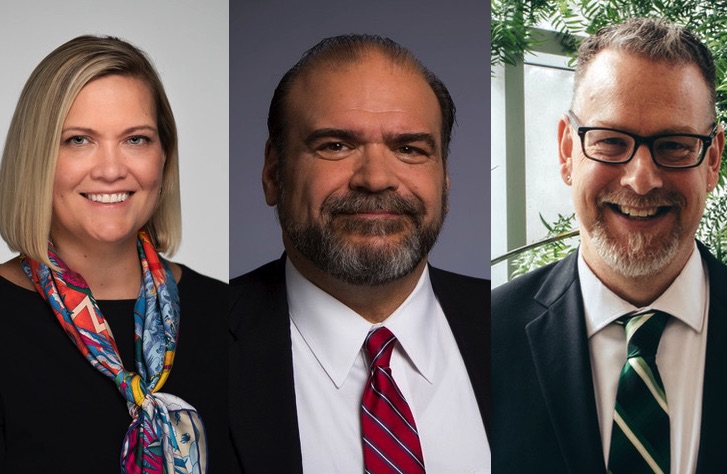
Emergency center ‘last piece of the puzzle’ for transforming Milwaukee County’s mental health system

From left to right: Carrie Killoran, president of the Greater Milwaukee patient service area for Advocate Aurora Health and chairperson of the Milwaukee Health Care Partnership; Pete Carlson, president of Advocate Aurora Behavioral Health; and Mike Lappen, Milwaukee County Behavioral Health Division administrator.
A proposed mental health emergency center is “really the last piece of the puzzle” for redesigning Milwaukee County’s mental health system, says Mike Lappen, administrator for the county’s Behavioral Health Division.
The center will take on emergency services now offered at the county’s aging Mental Health Complex.
It’s set to open in spring of next year through a joint venture between the county and area health systems, pending final approvals expected in February.
The county plans to contract with Granite Hills, a West Allis psychiatric hospital owned by Pennsylvania-based Universal Health Services that’s set to open later this year, for inpatient psychiatric services.
Lappen recently spoke with Wisconsin Health News. So did Carrie Killoran, president of the Greater Milwaukee patient service area for Advocate Aurora Health and chairperson of the Milwaukee Health Care Partnership, as well as Pete Carlson, president of Advocate Aurora Behavioral Health.
Excerpts from their interviews are below.
WHN: How did the health systems start working with the county on this effort?
Carrie Killoran: This has been a project that has been under evaluation for a significant amount of time, ever since the county came to the conclusion that it wasn’t going to be able to continue to operate the behavioral health services that it had in the past. When they contracted with Universal Health Services, it was determined that Universal was not going to operate a crisis psychiatric service in a way that the county had previously. In looking at that, there was a real concern within the community that we were going to have a gap in services for folks who were truly facing psychiatric crisis.
It really was, I think, a testament to the collaborative work of the healthcare system and our state and local governments to be able to look at this collaboratively and really what’s in the best interest of the community. There is a need here that we all identify and recognize.
We spent a lot of time evaluating a number of different options of how this service could best be provided to the community, including what we call a decentralized model, which is maybe folks should come to an emergency department in a hospital and get crisis behavioral health services there. We looked at that as an option, looked at continuing to have the county provide the services, just without the inpatient component they had operated in the process, and also went and looked at this kind of joint venture model, which is where we ultimately landed.
What led us down the path of saying we need the joint venture is the best way to go was really looking at the shared responsibility across the community. So looking at it from the county perspective and from each of the private health system’s perspectives, recognizing that we all have a role to play in this and we’re able to do it most effectively, most cost-effectively and with the highest quality of care if we do it collaboratively together rather than each of us trying to piece it together on our own.
Pete Carlson:
The healthcare systems have been working together collaboratively now since 2007. Part of it to me that made it successful was the fact that the health systems have been working collaboratively together and with the county much closer than I think people are aware of, so there has been some trust that’s built over time that has allowed this to happen.
WHN: Why a centralized model compared to a decentralized model?
Carrie Killoran: A centralized facility was first and foremost going to be in the best interest of patient care. When you think about the specialized staff and expertise that’s required to effectively provide this kind of crisis service, there’s not an abundance of professionals in the community that are able and trained and qualified to be able to do that. For each system on a decentralized basis to try to replicate that, it would just be frankly quite difficult to get the expertise that we needed at every site. That was certainly a driving factor.
The other consideration when we looked at it, honestly, was looking at it from a cost-effective basis. For each of us to make the investment that would be needed for us to have this available broadly at every hospital emergency department in the community, which is what we would need to do if we did not have a centralized model, certainly was going to be much more cost prohibitive.
Mike Lappen: (In a decentralized model) patients are essentially boarded in emergency rooms while they wait for a position to be able to be sent to an appropriate psychiatric facility. So the group discussed the challenge of the treatment director’s supplement and whether or not the Behavioral Health Division could put together enough mobile teams to go and make sure that was done within the required 24 hours. The way the law works is that 24 hours starts from the moment that someone is taken into custody. It doesn’t give you any break for nights or weekends or holidays. So that was a particular challenge.
The other challenge though was the available resources, both with physicians and nursing. There was a concern that we wouldn’t be able to find enough qualified staff spread out over all of those venues … if we went to that emergency room boarding model, the environment is not really conducive to people in a mental health crisis. If you think about it, the last place you want to go when you’re having the worst day of your life and you’re finding yourself in a really serious mental health crisis is a bustling emergency room full of people. It’s loud. And there’s all kinds of ligature risks and self-harm risks. And it’s just a real challenge for people to be treated appropriately.
A center of excellence, a centralized model, could be set up in a much more safe way to serve people. You can have line of sight to all of your patients. And then you’d have that skilled staff, with specialized training and experience to serve them. And then that centralized resource can also provide consultation to emergency rooms. And hopefully the understanding is that the health systems will expand their capabilities in their emergency rooms, but perhaps the most challenging cases will be prioritized to this new center.
WHN: Health systems in the greater Milwaukee area previously considered, but didn’t pursue, collaborative efforts to take on inpatient and emergency psychiatric services offered by the county. Why is this different?
Carrie Killoran:
I think there was a reluctance on the part of the healthcare systems to each say, ‘We’re going to take this on ourselves alone.’ We recognize it as a community-wide issue that needs to be addressed as a community-wide solution. And so this really was the first chance that we had to really say that we can come together with everyone at the table to form this true partnership.
Mike Lappen: I believe that actually, that first foray into this, when the health systems explored bidding for the actual contract that ended up going to (Universal Health Services), that in the time since then, they’ve learned a lot about what we do and the impact of that emergency room on their systems. And I think all of us developed a greater understanding about the whole continuum of care and the needs in our community. We all really believe in the work that HSRI
did, that Rob Henken and the (Wisconsin) Policy Forum helped sort of curate. It told us what was best for our community. And we believe that there’s some evidence in the numbers of where we’ve been successful. So I think there’s just been a more expanded understanding of the target group and the population that we all are serving together.
I think there’s more of an unprecedented sharing of responsibility, looking at this as a community need. I think in the past, it was sort of ‘county patient’ versus ‘health system patient’ and whatnot. And the leaders on the health system side have been great in coming up and recognizing that these are really all of our clients, they’re all of our customers. And if the goal is to create a healthier community, and that’s the county executive’s vision, that healthier community requires all of us to serve this population that hasn’t always been treated effectively. The issues around stigma with mental health and the disparities and the reimbursement and whatnot have really left this as an area where there aren’t adequate resources in our community.
The lessons learned from COVID-19 really reinforce the fact that there are areas in our community that have health disparities. The same health disparities that made the impact of COVID-19 more devastating to certain communities are the same disparities that show us that our customers aren’t being served with their mental health or substance use disorder needs. It’s the same zip codes that didn’t have the healthcare access that led to worse outcomes for COVID-19 that we see are the majority of referrals coming to the psychiatric crisis service. It’s a similar health disparity. So the idea is that the center of excellence will be located closer to the neighborhoods that generate the most emergency room visits but also that there will be a connector available to there, an intake or a front door, to really all of the services that we provide.
WHN: What impacts do you expect to see from COVID-19 on mental health?
Mike Lappen: We definitely expect an increase in need in the community. When you look at the devastation, both in loss of life and loss of jobs, disruption in people’s lives, when you think about the fact that schools aren’t open and kids are probably not getting the help they need during the school day, we believe all of those things point toward really an epidemic of mental health and substance use disorder needs. We do believe that this facility will be well timed in that it will provide access to services in a place that doesn’t have fantastic access today.
Pete Carlson: The changes that we’ve seen based on COVID, and I think that this is consistent, is that inpatient volumes are ebbing down slightly. Patients are more acute. People are still staying away because of the fear of being in a communal setting like that. So I do think that there is the potential for a tsunami of mental health activity to come out of this. I think it’s going to be more on the outpatient side, than hospital-based. But clearly we are seeing people that are more ill than we would normally see and it’s because they’re missing some of their care leading up to when they come to the hospital.
WHN: How will this address stigma?
Pete Carlson: I think one of the silver linings of the pandemic is that I think depression, anxiety, having more stress in our lives, all of us, than we’re used to because of the pandemic to me has normalized behavioral health in many ways for many people. Because, how do you say you’re not impacted by it in today’s world? We all are. It doesn’t mean that everybody needs to go and see a psychiatrist or go get psychotherapy support. But I do think it makes it more understandable to people. For me, that’s a positive that’s come out of the pandemic.
Carrie Killoran: It’s not going to be part of a massive medical complex. Where the Mental Health Complex is located now is on the county grounds. You’ve got Froedtert, you’ve got Children’s, you’ve got the Medical College (of Wisconsin). It is a bustling, busy place that I think can be a little bit intimidating and challenging to navigate sometimes for folks. This, we’re really envisioning something that will be much more community-based, easy to access right off of the freeway, close to downtown. That really puts it in a place that I think will be really accessible for folks.
Mike Lappen: Having buy-in from the health systems that we’re all in this together, I believe that really helps address the stigma associated with seeking care for mental health and substance use disorders … We’re all in it together and we’re serving people in a center of excellence just like we have a trauma center and a stroke center and special services for populations of special needs around health. Maybe this is one more step to demonstrating that these are just health conditions and that we should not feel a shame or a reluctance to seek help in a mental health crisis.
This article first appeared in the Wisconsin Health News daily email newsletter. Sign up for your free trial here.





